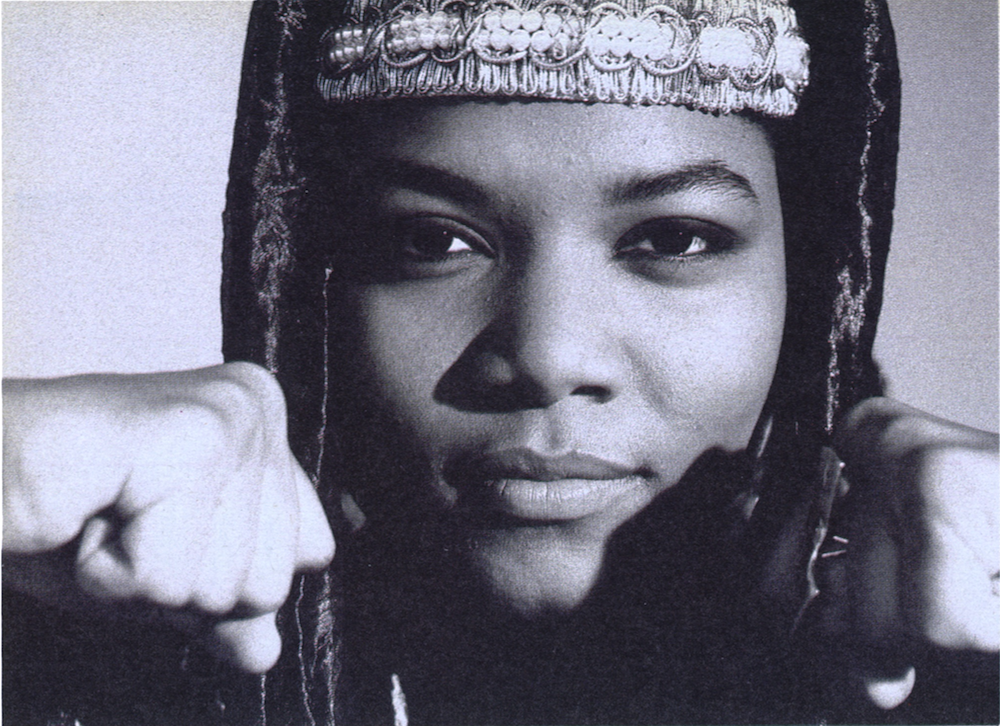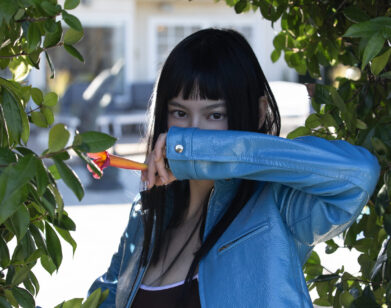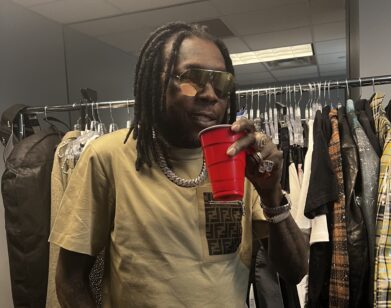New Again: Queen Latifah

Today, Queen Latifah hosts faltering talk shows, sings at the Super Bowl, marries people at the Grammy Awards, and gets promptly shunted to the side by Ryan Lewis when it’s time for Madonna to come on. In 1990, however, Dana Elaine Owens was a renegade rapper with a successful debut album, All Hail the Queen. She was also an integral member of the semi-political hip-hop collective Native Tongues alongside A Tribe Called Quest, De La Soul, Common, Mos Def, and the Jungle Brothers. One of the few women to achieve success in the world of hip-hop at the time, Latifah wasn’t afraid to be labeled a feminist (or she was a little afraid and preferred the term “pro-woman,” but oh well). In her hit single “Ladies First,” Latifah railed against gender stereotypes and proclaimed “A woman can bear you break you take you” in front of images of strong black women such as Angela Davis. Here’s what Queen L. had to say to us in May of 1990.
The Queen of Hip-Hop
By Dimitri Ehrlich
“Latifah” is an Arabic word meaning “delicate and sensitive,” but it takes more than just a nice attitude to get a debut album into the black top ten and two eye-catching videos on MTV. Queen Latifah’s All Hail the Queen is not your run-of-the-mill debut. It features Daddy-O, of Stetsasonic, KRS-One, and members of De La Soul, to name a few of rap’s heavyweights. But her album stands out for much more than just the names on it. In collaboration with her DJ, Mark the 45 King, Latifah has created an eclectic record borrowing freely from hip-hop, house, jazz, and reggae. She stands out not because she is a female rapper, but because she is an excellent rapper who mixes rapping with singing.
DIMITRI EHRLICH: Tell me how you would up rapping on David Bowie’s remix of “Fame.”
QUEEN LATIFAH: Mark, my producer, told me that David Bowie had heard my stuff, liked it, and wanted me to do something with him. I sang over some of Bowie’s parts and did some 24-bar-rap.
EHRLICH: EPMD uses “Fame” as the main sample for one of the cuts on their most recent album.
LATIFAH: Really? I can’t see him allowing that if he was planning on rereleasing his own version.
EHRLICH: Sampling in rap has posed new legal questions regarding creative rights versus copyright infringement. In some cases the music risks becoming a kind of digital cannibalism. On the other hand, sampling has rejuvenated certain artists; as Stetsasonic say, “James Brown was old/Until Eric and Ra came out with â??I Got Soul.'” What do you think about this issue?
LATIFAH: Rappers started sampling James Brown’s stuff, and it started selling; that’s what the key was. Once it started selling, then there was a problem. Then the sample musicians and their publishers want a piece of the pie.
EHRLICH: Are the cases still being litigated, or has anybody figured out what to do?
LATIFAH: We figured it out. Tommy Boy Records clears all our samples with the copyright owners before we use them.
EHRLICH: I think it’s great that the women you chose for your dancers have the kind of image that young people can look up to. I mean, compared with the women on the videos for Big Daddy Kane’s “I Get the Job Done” or Young M.C.’s “Principal’s Office.”
LATIFAH: Those women are pretty shallow. They look like skeezers, and that’s the problem. A lot of those females don’t have respect for themselves. Guys are exploiting them.
EHRLICH: In what way?
LATIFAH: The roles they’re playing in these videos are just bitches that come with money. That’s the kind of message they’re putting out to these kids. Pure materialism.
EHRLICH: Which reflects how a lot of people think.
LATIFAH: But it shouldn’t be. And if you keep perpetuating it, we’re gonna have a lot more kids out here selling and using drugs. Because that’s the quickest way to make money. The females don’t respect themselves; they only think materialistically. They want money, but they don’t think, I’m gonna get this money on my own, they think, I’m gonna get money from this guy.
EHRLICH: Well, that’s like the anthem of how crack made prostitution boom among little girls: “The girlies are free, ’cause crack costs money.”
LATIFAH: That’s so true. Girls are out there doing it, and guys are givin’ themselves up too. It’s a sickness. So is the image of a big gold chain, a fantastic Benz, and girls around you. But you can still live swellâ??I do.
EHRLICH: What’s your definition of living swell?
LATIFAH: I’m not living large; I just want to live comfortably. I wanna have financial stability that is unshakable. Real estate. Maybe a C.D. I think I’d like to invest in solar cars. I’d also life to have money so that I could do things that don’t benefit me at all. I want to build a housing developmentâ??a big one, a real def oneâ??and pay for people myself.
EHRLICH: An ideal community for people you love?
LATIFAH: No, not for my friends; they can do it on their own. I’m talking about lower-income families. But it’d be def, it’d be real, real, real nice.
EHRLICH: On the “Ladies First” video there’s a two-second spot with a line of female rappers, like Shelly Thunder and Ms. Melody, and it’s like they’re all showing their support for you. Are you all friends?
LATIFAH: Yeah. I invited them all to the shoot. I invited MC Lyte too, but Lyte had to help her mother move that day.
EHRLICH: You have a nice voice. That’s what everybody talks about: the fact that you combine rapping and singing.
LATIFAH: I think it would bore to be all hard-core.
EHRLICH: What do you do after your performances?
LATIFAH: Whatever’s clever.
THIS ARTICLE INTIALLY APPEARED IN THE MAY 1990 ISSUE OFÂ INTERVIEW.Â
New Again runs every Wednesday. For more, click here.
Â






